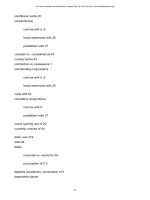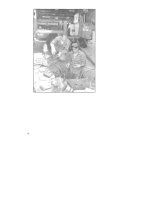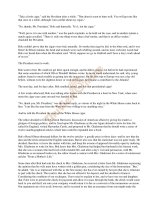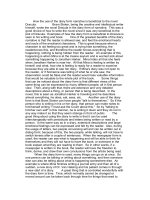The use of refkexive pronouns 9 ppt
Bạn đang xem bản rút gọn của tài liệu. Xem và tải ngay bản đầy đủ của tài liệu tại đây (235.5 KB, 6 trang )
? The sweater is too big. 1
? The ruler isn't long enough. 2
3 ………………….
Too and enough (A-B)
Look at what people are saying and complete the sentences. Use too, too many, too much or enough with
these words: clearly, complicated, difficult, expensive, food, hastily, mistakes, rain, sweet, traffic
? You should have stopped to think first. You acted too hastily.
? This quiz is rather easy. The questions aren't difficult enough.
1 Can I have some more sugar in my coffee, please? It isn't
2 I can't afford a new stereo. It would be .
3 There's a water shortage. There just hasn't been
4 I can't read your writing. You don't write
5 Try to be more careful, please. You're making
6 The roads are very crowded. There's simply
7 I can't understand these instructions. They're
8 Thousands of people are starving because they can't get
Other structures with too and enough (C)
Comment on the situations. Use too or enough and a phrase with jor or a to-infinitive.
? A taxi would have been best. But you didn't have the money.
I didn't have enough money for a taxi.
? Sarah can't take a day off. She's very busy.
Sarah is too busy to take a day off.
1 A picnic would be nice. But it's wet.
2 All your guests will need chairs. But you haven't got very many.
3 You couldn't carry the equipment. You had such a lot.
4 Natasha wants to be a professional musician. You think she's very good.
117 Exercises
1 Too and enough (A-B)
Look at the pictures and write sentences with too and enough.
Use these nouns and adjectives: big, gate, long, low, plane, sweater, ruler, warm, water, wide
TEST 20 Adverbs and word order (Units 113-117)
Test 20A
Put each word in brackets into the sentence.
► Anna arrives for work, (late)
Anna arrives late for work.
1 I like old cowboy films, (quite)
2 Have you finished this magazine? (yet)
3 This coat is big. (too)
4 Have the children had their tea? (already)
5 You don't look ill. (certainly)
6 We don't go out. (much)
7 I think everyone works hard, (fairly)
8 I don't know the date of the meeting, (still)
9 The others are getting ready, (just)
10 I have to go to work, (on Saturdays)
Test 20B
Put the words in the right order to form a statement.
► I / love / really / these trousers
I really love these trousers.
1 is / rather / silly / this game
2 already / I've / paid / the bill
3 enough / isn't / loud / the alarm
4 easily / Jonathan / passed / the test
5 a lot / cards / play / the children
6 didn't / enough / sell / they / tickets
7 ask / many / questions / too / you
8 a member / any more / of the club / I'm / not
9 enough / it's / outside / to sit / warm
Test 20C
Read the conversation. Then look at the answers below and write the correct answer in each space.
Martin: Hello, Nancy. (►) How are you? Have you found a job (1)……………… ?
Nancy: No, I'm afraid not, but I'm (2) ………… looking. It's taking (3)…………………… longer
than I expected. The problem is there just aren't (4) jobs.
And there are too (5) people looking for jobs.
Martin: I'm old enough (6)…………………… remember when there was plenty of work.
Nancy: There used to be lots of work, but there isn't (7) more.
I'm afraid I'm (8)…………………. longer as optimistic as I was a few weeks ago.
In fact I feel a (9) depressed about it sometimes.
Martin: Don't worry. You'll (10) find something, I expect.
► a) How b) What c) Who d) Why 6 a) for b) of c) that d) to
1 a) longer b) soon c) still d) yet 7 a) any b) no c) now d) some
2 a) already b) more c) still d) yet 8 a) any b) never c) no d) not
3 a) more b) quite c) rather d) some 9 a) bit b) piece c) quite d) slightly
4 a) enough b) plenty c) right d) several 10 a) already b) yet c) soon
5 a) big b) lot c) many d) much d) before very long
Test 20 D
Each of these sentences has a mistake in it. Write the correct sentence.
► My friend calls always for me. My friend always calls jor me.
1 I didn't last night sleep very well.
2 1 think I need to rest little.
3 I-don't work for the company-longer.
4 The article is fair interesting.
5 Tessa locked carefully the door.
6 You aren't enough tall to play basketball.
7 We went yesterday to town.
8 Hike this music much.
Test 20E
Write a second sentence so that it has a similar meaning to the first. Use the word in brackets.
► It's probable that the strike will be over soon, (probably)
The strike will probably be over soon.
1 We often go to the cinema, (a lot)
2 Adrian wears jeans all the time, (always)
3 These shoes are too small, (big)
4 I don't live in Birmingham any more, (no)
5 Polly spent more money than she should have done in the sales, (too)
Prepositions of place
A Meanings
The bird is in/inside
the cage.
Sarah is diving in/into
the water.
Tom is getting out of They're waiting outside
the car. the bank.
The jug is on the table.
The case is on top of the Emma is putting her
wardrobe. luggage on/onto the
trolley.
Henry is falling off
the horse.
Rachel is at the bus stop.
The table is by/beside Jessica is sitting next to
the bed. Andrew.
The airport is near
Manchester.
The coach is going to
London.
The letter is from
Chicago.
Matthew is walking
towards the sun.
Vicky is running away
from the fire.
There's a bridge over
the river.
Tom is under the car.
The plane is above
the clouds.
The temperature is
below zero.
The cyclist is in front of The cyclist is behind Rita is going up the Daniel is coming down
the bus. the tractor. stairs. the stairs.
The house is among Jackson is between Jessica is sitting opposite They're running
the trees. Memphis and New Andrew. around/round the track.
Orleans.
B Position and movement
Most of these prepositions can express either position (where something is) or
movement (where it is going). Position: The coin was under the sofa.
Movement: The coin rolled under the sofa.
Now look at these examples with in and on expressing position.
The manager was in the office. The papers were on the floor. To express movement, we use into and
onto, but we can also use in and on, especially in informal English.
The manager came in/into the office. The papers fell on/onto the floor.
At expresses position, and to expresses movement.
Position: Vicky was at the doctor's. Movement:
Vicky went to the doctor's.
> page 380 British and American English
Melanie is running The cars are going Trevor is walking along The car is going past
across the road. through the tunnel. the street. the house.
► Sarah is getting out of the 1 David is going 2 The furniture is……
taxi. the ladder. the van.
3 My friend lives in a flat 4 The boss is coming 5 There's a garage…….
a shop. the corridor. the house.
6 We walked ………. 7 There's a statue 8 Tom and Nick are walking
the lake. the museum. the stadium.
2 Prepositions of place (A)
Complete the conversations. Choose the correct preposition.
1 Vicky: I felt really afraid when I was walking home from/off the club. All the time I could hear
someone behind/in front of me, but I didn't dare turn round.
Rachel: I expect you were imagining it.
Vicky: No, I wasn't. I saw him after I'd come in across/through the gate. He was wearing a long
black coat that came down well below/under his knees.
2 Daniel: You know Adam, don't you? He's very strange. He walked right along/past me yesterday as I
was coming among/down the stairs, but he didn't say hello.
Matthew: The other day he was sitting beside/opposite me at lunch, so I couldn't help looking at him, I
said hello, but he didn't speak.
Exerc
i
ses
1 Prepositions of place (A)
Put in the prepositions. Sometimes more than one answer is correct.









